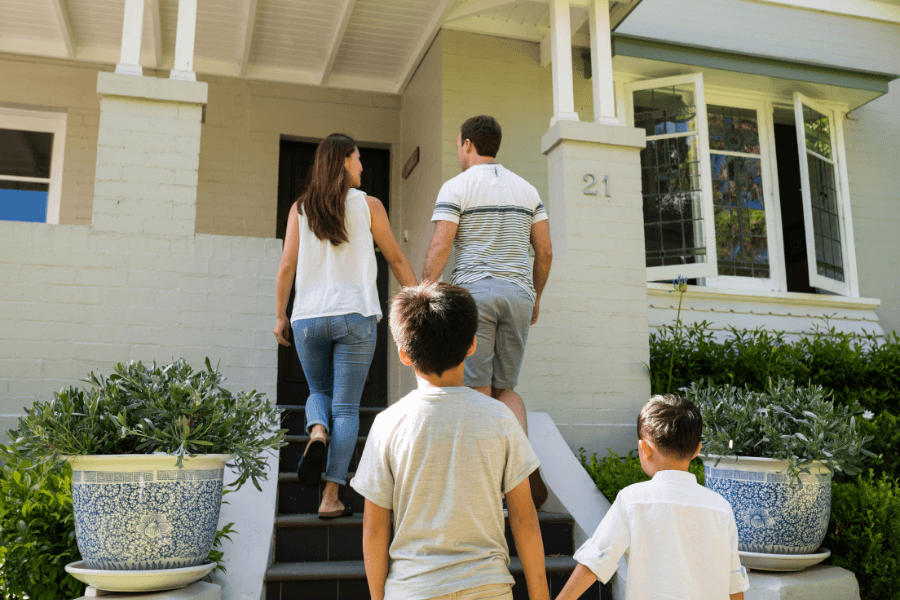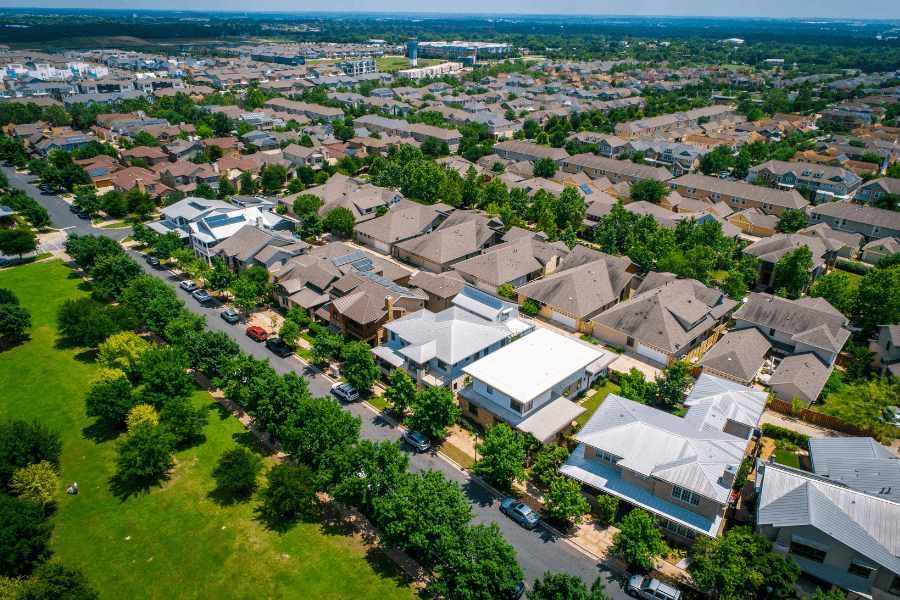One of the questions first time home buyers frequently ask is how much deposit do you need for a house? In this comprehensive guide, we show you how much you really need for a home deposit, bust some long-standing myths, and answer frequently asked questions about home deposits, home loans, and more.
Topics in this article:
What is a house deposit?
When buying a house, you are legally required to pay a one-off first portion of the sale price or ‘deposit’, in order to secure the property and get the home loan application accepted. The amount of money you pay as a deposit is the total equity you own of the property at the time.
How much should you save for a house deposit?
The ideal target for a home deposit is 20% of the property’s purchase price as well as enough to cover other costs of buying a home. However, the 20% “rule” is not really a rule, more like an ideal target. The 20% deposit target only comes into play if you want to avoid Lenders’ Mortgage Insurance – which we’ll explain later.
How much should I save a month to buy a home?
This should depend on your income, but the best way to save is to use the 50/30/20 method – 50% on essentials, 30% on disposable income, and 20% for your home. You could swap the 20% and 30% pools to save faster.
Find out how to be mortgage-free by 35.
What’s the lowest deposit you can put on a house?
You can purchase a property with as little as 5% deposit – and in some extreme circumstances, even as low as 1%. If you are approved for finance with such low deposit figures, you will need to know there are additional costs involved.
Home loan repayment calculator
If you’re unsure how much you would need to spend each month on your mortgage, you should use a home loan repayment calculator to give you an approximate. You will need to know your interest rate, loan term, and amount you intend to borrow.
What is Lenders’ Mortgage Insurance?
Your home loan will be increased by a one-time, non-refundable, non-transferrable premium known as Lenders Mortgage Insurance (LMI). It is determined by the sum of your down payment and the amount you borrow. The cost will be less if you make a larger deposit on your property. LMI is not an insurance policy for you – but more for the bank to protect against risk.
What is a Loan to Value Ratio?
Your Loan to Value Ratio is the proportion of your house’s worth compared with how much is borrowed against it. If you have a house worth $500,000 and still need to pay $200,000, you have a loan to value ratio of 40%.
How to save a house deposit?
If 20% deposit is out of reach, you may want to lower your expectations to 5% and save up for Lender’s Mortgage Insurance instead. Here are some ways to save for a house deposit.
How to save for a house deposit while renting?
If you are renting, you may have to cut down on disposable expenses and redirect that as much as possible to savings. That may mean deferring on large purchases such as cars, furniture, or electronics.
How to save for a home deposit on a low income?
If you are wondering how to buy a house in Australia on a low income and are intent on saving for one, you may want to look into first home bonus saver accounts offered by some banks and credit unions. These accounts have additional bonus interest if you deposit regularly and don’t withdraw the money.

First home buyers’ government support
There are several schemes in place to help first time home buyers reach their goal of home ownership sooner such as state and federal First Home Buyer’s Grants. These may be doubled if you move into a regional area. Banks and lenders often use these grants as funds given towards a deposit.
There is also the First Home Loan Deposit Scheme, which allows first home buyers to purchase a property with as much as 5% deposit without paying for LMI, and the Family Home Guarantee which gives single parents the opportunity to buy a home with 2% deposit without incurring LMI.
Learn how to avoid first home buyer mistakes.
When do I pay the deposit when buying a house?
There are two types of deposits when buying a home – the holding deposit and the full deposit. These types of deposits are called “deposit on contract” and occur after a sale is agreed to.
What is a holding deposit when purchasing a property?
The main difference between a full deposit and a holding deposit is that the home deposit is usually compulsory while the holding deposit is not. You may offer a holding deposit to show that you’re serious about buying the property and to edge out any potential competition. A full deposit is between 2.5% to 10% of the purchase price while a holding deposit is negotiated between you and the seller and is a far smaller figure.
Can I use my super for a house deposit?
Yes – through the First Home Super Saver scheme. You can make voluntary concessional (before tax) and voluntary non-concessional (after-tax) contributions into your super and have a maximum of $15,000 of your voluntary contributions from any one financial year to be released. For more information, visit the ATO.
Can you use equity in a property as a house deposit?
If you have sufficient equity in a property (over 20% of your current property and 20% of the new property), you can use it as a deposit towards another property. You will have to draw down on the equity as a line of credit or cash out to use it, as house deposits must be made in cash.
Does using equity increase monthly repayments?
If you do not refinance the loan to a longer term or lower rate, it will likely increase your monthly payments as your principal will increase. However, there are mistakes to avoid when refinancing your home loan.
Other expenses to consider
Other expenses you need to consider is the stamp duty – although as a first home buyer you may have concessions or exemptions. You also need to pay for legal costs and conveyancing fees, building and pest inspections, and home and contents insurance. You will also have to pay mortgage establishment and registration fees as well.
If you’re a first time home buyer, learn more about why to be wary of stamp duty incentives.
FAQs about house deposits and loans
Here are some more FAQs about house deposits, loans, and whether you can get a home loan without a deposit.
Can you buy a house without a deposit in Australia?
A bank will not approve a home loan to someone with no deposit whatsoever. However, there are ways around this. You can approach a bank with a guarantor. A guarantor is someone trusted who has good credit and high or total equity in an existing property. You essentially “piggyback” onto their property and use it as a security. However, the guarantor is responsible for the loan just as much as the borrower.
How much can I borrow on a home loan without a deposit?
If you have a guarantor, you may be able to borrow up to 100% of the purchase price – sometimes even up to 120%.
Can you use shares as equity for a home deposit?
No. You will have to cash out the shares if you wish to use their value as a home deposit.
Written by:
Bill Tsouvalas – Personal Finance Expert – Founder and CEO at Savvy
Bill Tsouvalas is the Founder and CEO of Savvy, one of Australia’s most trusted asset finance brokers specialising in both private and commercial vehicle financing as well as equipment for businesses. Bill has worked in the finance industry for almost two decades, giving him a wealth of knowledge across personal finance that enabled him to found his own brokerage at the age of just 23 which focused on the then-largely untapped market of online finance.







Really useful and important post for the peoples who are trying to buy new house for their own.
Thanks for sharing this article.